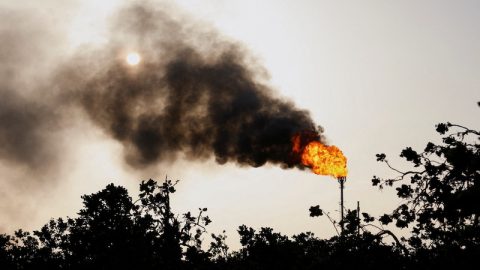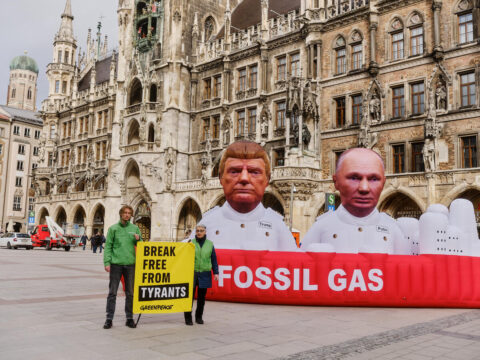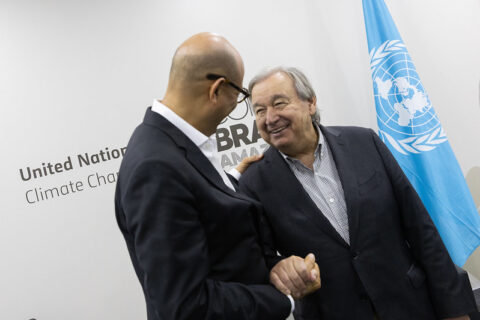COP29 talks on measures to cut emissions and progress a landmark agreement on “transitioning away from fossil fuels” had to be rescued from the brink of collapse by the COP presidency after opposition from oil-rich Saudi Arabia and some other developing countries.
Countries failed to reach an agreement on mitigation over the weekend and a decision was taken to postpone talks until next year. But COP29 president Mukhtar Babayev announced efforts to restore talks on Monday at a plenary, backed by many countries supporting a strong outcome in Baku this week.
“COP29 cannot and will not be silent on mitigation. We will address the matter [in] every direction,” Babayev told the COP plenary.
Governments have struggled to reaffirm a pledge first agreed at COP28 last year to “transition away from fossil fuels” in other agreements this year. It was left out of a climate and biodiversity decision at last month’s COP16 in Cali and reports suggested it also struggled to make it into the G20 ministerial statement.
Manuel Pulgar-Vidal, former COP president and WWF climate and energy lead, said finance for the energy transition will play a key role in unlocking progress on mitigation, as developing countries called for funding for the energy transition.
“After a faltering first week, Parties now have a second chance to work together and build consensus around the climate solutions we need to reduce emissions quickly. It is essential that this COP sends a strong signal that countries need to raise their game on emission reductions,” Pulgar-Vidal said in a statement.
Brink of collapse
Late on Saturday, when many COP29 delegates were letting their hair down after a long first week, negotiators failed to agree on a path forward for discussions on cutting emissions.
A coalition of developed countries, small island states, the least developed countries (LDCs) and some Latin American nations want to discuss how to take forward last year’s global commitment to transition away from fossil fuels through the so-called Mitigation Work Programme, a negotiating track set up at COP26 in 2021 with the goal of enhancing efforts to cut emissions.
They had pushed to set up an emissions-cutting “ facilitation process and platform” and “urge” governments to do things like stop building new coal-fired power plants and phase out (not just, as previously agreed, phase down) coal, according to observers.
The coalition wanted to set numerical targets for reducing methane emissions, curbing deforestation, increasing energy storage and improving grids to enable the roll-out of renewable energy.
But, speaking in Saturday night’s plenary, Saudi Arabia said this was an attempt at “eroding the flexibility developing countries depend on” and that there should be no new targets or goals.
Bolivia, speaking on behalf of the LMDC group which includes China, also rejected “targets and outlandish proposals”. Iran and India supported this, with India saying that the talks’ conclusions were supposed to be “non prescriptive”. The African group also rejected “attempts to impose new requirements”.
With governments divided over the purpose of the talks, their co-chairs suggested on Saturday not continuing the mitigation negotiations into the second week and delaying them for six months until the mid-year climate talks in the German city of Bonn. That would have meant scrapping all the work done in the first week. A consensus could not be reached to carry on with the talks in Baku.
Andreas Sieber, associate director of policy and campaigns at 350.org, said Saudi Arabia wants to be as “unconstructive as they can be when it comes to fossil fuels” and is “happy to be destructive”. He added that civil society “disagrees” with this stance because there is a need to talk about implementing last year’s decisions on energy transition as well as financing arrangements for that to happen including through the new climate finance goal.
Presidency steps in
On Monday, COP29 President Mukhtar Babayev said he would make efforts to prevent the talks from collapsing, appointing ministers from Norway and South Africa to consult countries on the way forward.
At a plenary session, several countries expressed disappointment with the state of the mitigation talks, saying a strong outcome on emission-cutting measures was a priority for them. They also refused to postpone discussions until next year.
Australia, on behalf of the Umbrella Group of developed countries, said “some parties consistently blocked” progress and welcomed the presidency’s efforts to keep the talks going.
The AOSIS group of small islands said they would not leave Baku without “a strong mitigation outcome”. “The fact that those discussions are stalled is extremely concerning for our group,” a negotiator from Samoa told the COP plenary.
The COP president said his team will run consultations with countries, which will be facilitated by Norway and South Africa and will conclude by Wednesday. He also ruled out the possibility of a cover text, which is a high-profile general statement signed off by all governments but not linked to any particular strand of the negotiations.
New climate plans
Speaking at the Monday plenary, Switzerland noted that decisions made in Baku on mitigation will serve to inform the next round of national climate plans, which are due to be submitted by early next year. “It’s not acceptable that in the very body meant to reduce emissions we do not have a clear message going forward,” the Swiss negotiator said.
The European Union waded into the debate on Monday afternoon, with its climate commissioner Hoekstra saying it was “imperative” to send a strong signal from Baku to inform the next round of nationally determined contributions (NDCs). “We must follow on our historic decision in Dubai to truly transition away from fossil fuels,” he added.
He praised the announcements of 2035 emissions reduction goals from the UAE, Brazil and the UK before and during COP29 as “positive and promising”.
He also added that the EU would put together an ambitious NDC in line with the 1.5C warming limit, and is on the right track, cutting greenhouse gas emissions by more than 8% in 2023, compared to the previous year. “We need – and we will continue to keep the pace,” he said, without clarifying when the EU’s updated NDC would land.
(Reporting by Sebastian Rodriguez; editing by Matteo Civillini)
The post Fossil fuel transition talks rescued from brink of collapse at COP29 appeared first on Climate Home News.
Fossil fuel transition talks rescued from brink of collapse at COP29
Climate Change
World leaders invited to see Pacific climate destruction before COP31
The leaders and climate ministers of governments around the world will be invited to meetings on the Pacific islands of Fiji, Palau and Tuvalu in the months leading up to the COP31 climate summit in November.
Under a deal struck between Pacific nations, Fiji will host the official annual pre-COP meeting, at which climate ministers and negotiators discuss contentious issues with the COP Presidency to help make the climate summit smoother.
This pre-COP, expected to be held in early October, will include a “special leaders’ component” hosted in neighbouring Tuvalu – 2.5-hour flight north – according to a statement issued by the Australian COP31 President of Negotiations Chris Bowen on LinkedIn on Thursday.
Bowen said this “will bring a global focus to the most pressing challenges facing our region and support investment in solutions which are fit for purpose for our region.” Australia will provide operational and logistical support for the event, he said.
Like many Pacific island nations, Tuvalu, which is home to around 10,000 people, is threatened by rising sea levels, as salt water and waves damage homes, water supplies, farms and infrastructure.
Dozens of heads of state and government usually attend COP summits, but only a handful take part in pre-COP meetings. COP31 will be held in the Turkish city of Antalya in November, after an unusual compromise deal struck between Australia and Türkiye.
In addition, Pacific country Palau will host a climate event as part of the annual Pacific Islands Forum (PIF) – which convenes 18 Pacific nations – in August.
Palau’s President Surangel Whipps Jr told the Australian Broadcasting Corporation (ABC) that this meeting would be a “launching board” to build momentum for COP31 and would draw new commitments from other countries to help Pacific nations cut emissions and adapt to climate change.
“At the PIF our priorities are going to be 100 per cent renewables, the ocean-climate nexus and … accelerating investments that build resilience from climate change,” he told ABC.
The post World leaders invited to see Pacific climate destruction before COP31 appeared first on Climate Home News.
World leaders invited to see Pacific climate destruction before COP31
Climate Change
There is hope for Venezuela’s future – and it isn’t based on oil
Alejandro Álvarez Iragorry is a Venezuelan ecologist and coordinator of Clima 21, an environmental NGO. Cat Rainsford is a transition minerals investigator for Global Witness and former Venezuela analyst for a Latin American think tank.
In 1975, former Venezuelan oil minister Juan Pablo Pérez Alfonzo gave a now infamous warning.
“Oil will bring us ruin,” he declared. “It is the devil’s excrement. We are drowning in the devil’s excrement.”
At the time, his words seemed excessively gloomy to many Venezuelans. The country was in a period of rapid modernisation, fuelled by its booming oil economy. Caracas was a thriving cultural hotspot. Everything seemed good. But history proved Pérez right.
Over the following decades, Venezuela’s oil dependence came to seem like a curse. After the 1980s oil price crash, political turmoil paved the way for the election of populist Hugo Chávez, who built a socialist state on oil money, only for falling prices and corruption to drive it into ruin.
By 2025, poverty and growing repression under Chávez’s successor Nicolás Maduro had forced nearly 8 million Venezuelans to leave the country.
Venezuela is now at a crossroads. Since the US abducted Maduro on January 3 and seized control of the country’s oil revenues in a nakedly imperial act, all attention has been on getting the country’s dilapidated oil infrastructure pumping again.
But Venezuelans deserve more than plunder and fighting over a planet-wrecking resource that has fostered chronic instability and dispossession. Right now, 80% of Venezuelans live below the poverty line. Venezuelans are desperate for jobs, income and change.
Real change, though, won’t come through more oil dependency or profiteering by foreign elites. Instead, it is renewable energy that offers a pathway forward, towards sovereignty, stability and peace.
Guri Dam and Venezuela’s hydropower decline
Venezuela boasts some of the strongest potential for renewable energy generation in the region. Two-thirds of the country’s own electricity comes from hydropower, mostly from the massive Guri Dam in the southern state of Bolívar. This is one of the largest dams in Latin America with a capacity of over 10 gigawatts, even providing power to parts of Colombia and Brazil.
Guri has become another symbol of Venezuela’s mismanagement. Lack of diversification caused over-reliance on Guri for domestic power, making the system vulnerable to droughts. Poor maintenance reduced Guri’s capacity and planned supporting projects such as the Tocoma Dam were bled dry by corruption. The country was left plagued by blackouts and increasingly turned to dirty thermoelectric plants and petrol generators for power.
Today, industry analysis suggests that Venezuela is producing at about 30% of its hydropower capacity. Rehabilitating this neglected infrastructure could re-establish clean power as the backbone of domestic industry, while the country’s abundant river system offers numerous opportunities for smaller, sustainable hydro projects that promote rural electrification.
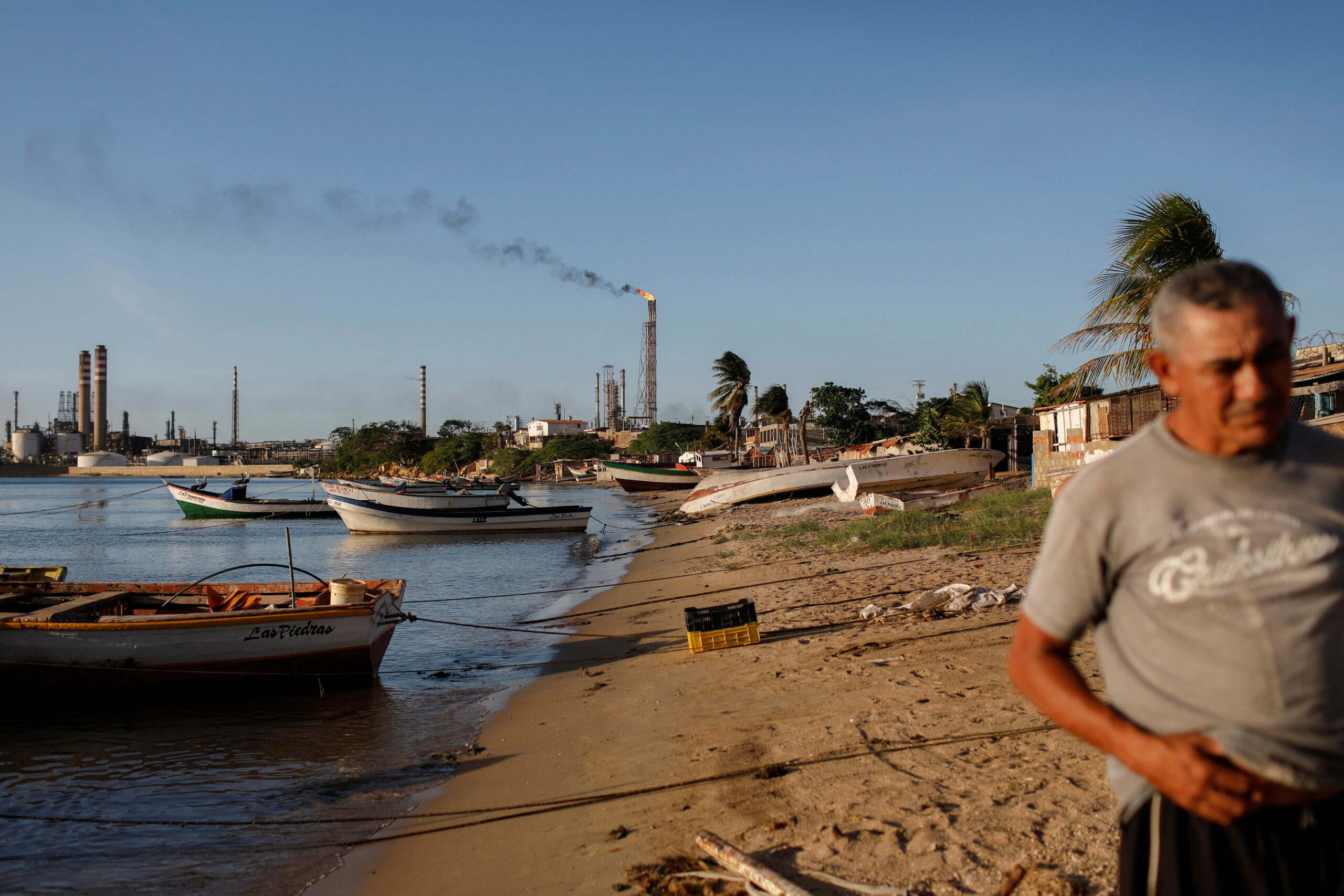

Venezuela also has huge, untapped promise in wind power that could provide vital diversification from hydropower. The coastal states of Zulia and Falcón boast wind speeds in the ideal range for electricity generation, with potential to add up to 12 gigawatts to the grid. Yet planned projects in both states have stalled, leaving abandoned turbines rusting in fields and millions of dollars unaccounted for.
Solar power is more neglected. One announced solar plant on the island of Los Roques remains non-functional a decade later, and a Chávez-era programme to supply solar panels to rural households ground to a halt when oil prices fell. Yet nearly a fifth of the country receives levels of solar radiation that rival leading regions such as northern Chile.
Developing Venezuela’s renewables potential would be a massive undertaking. Investment would be needed, local concerns around a just and equitable transition would have to be navigated and infrastructure development carefully managed.
Rebuilding Venezuela with a climate-driven energy transition
A shift in political vision would be needed to ensure that Venezuela’s renewable energy was not used to simply free up more oil for export, as in the past, but to power a diversified domestic economy free from oil-driven cycles of boom and bust.
Ultimately, these decisions must be taken by democratically elected leaders. But to date, no timeline for elections has been set, and Venezuela’s future hangs in the balance. Supporting the country to make this shift is in all of our interests.
What’s clear is that Venezuela’s energy future should not lie in oil. Fossil fuel majors have not leapt to commit the estimated $100 billion needed to revitalise the sector, with ExxonMobil declaring Venezuela “uninvestable”. The issues are not only political. Venezuela’s heavy, sour crude is expensive to refine, making it dubious whether many projects would reach break-even margins.
Behind it all looms the spectre of climate change. The world must urgently move away from fossil fuels. Beyond environmental concerns, it’s simply good economics.
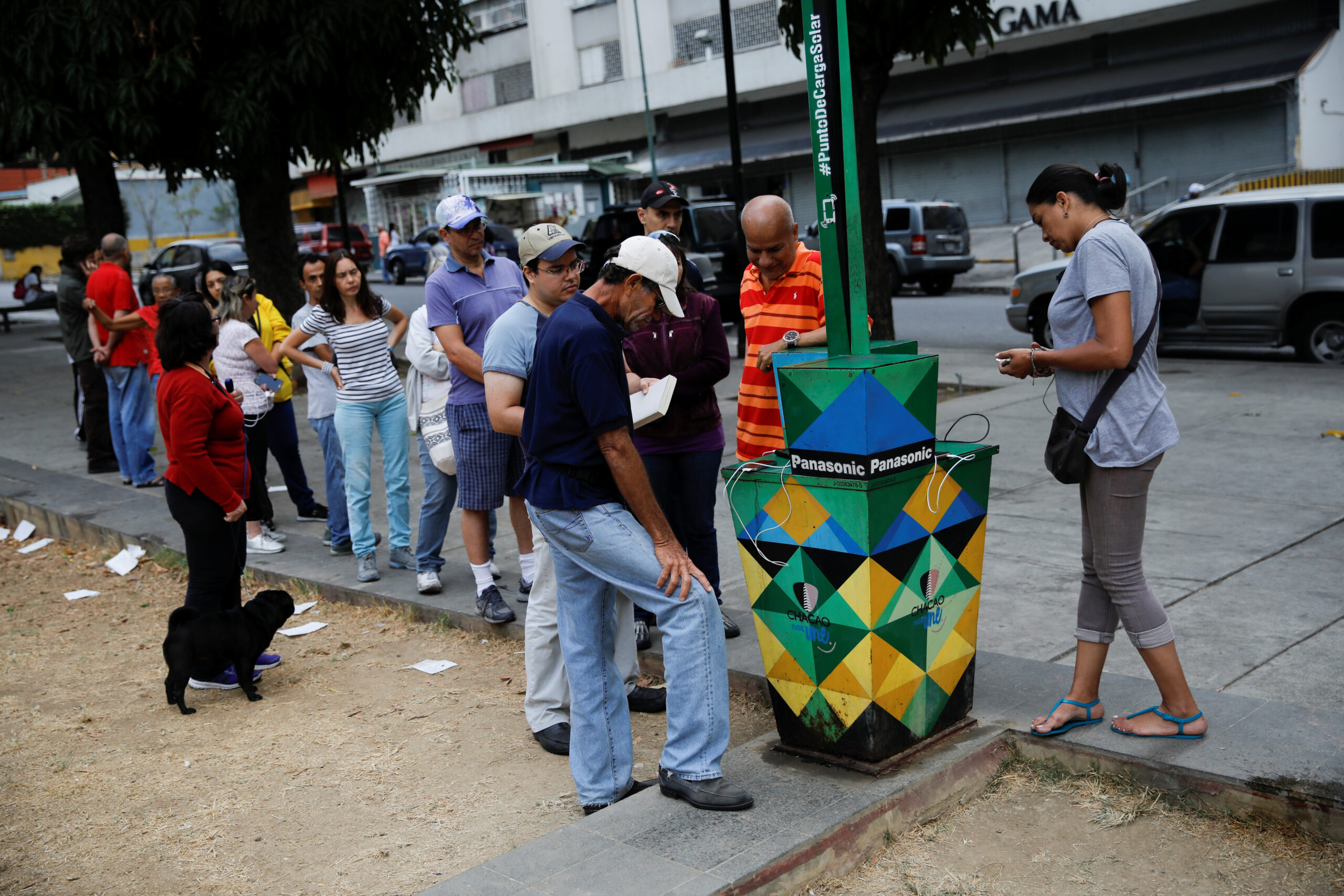

Recent analysis by the International Renewable Energy Agency finds that 91% of new renewable energy projects are now cheaper than their fossil fuel alternatives. China, the world’s leading oil buyer, is among the most rapid adopters.
Tethering Venezuela’s future to an outdated commodity leaves the country in a lose-lose situation. Either oil demand drops and Venezuela is left with nothing. Or climate change runs rampant, devastating vulnerable communities with coastal loss, flooding, fires and heatwaves. Meanwhile, Venezuela remains locked in the same destructive economic swings that once led to dictatorship and mass emigration. There is another way.
Venezuelans rightfully demand a political transition, with their own chosen leaders. But to ensure this transition is lasting and stable, Venezuela needs more – it needs an energy transition.
The post There is hope for Venezuela’s future – and it isn’t based on oil appeared first on Climate Home News.
There is hope for Venezuela’s future – and it isn’t based on oil
Climate Change
UN’s new carbon market delivers first credits through Myanmar cookstove project
A cleaner cooking initiative in Myanmar is set to generate the first-ever batch of carbon credits under the new UN carbon market, more than a decade after the mechanism was first envisioned in the Paris Agreement.
The Article 6.4 Supervisory Body has approved the issuance of 60,000 credits, which correspond to tonnes of carbon dioxide equivalent reduced by distributing more efficient cookstoves that need less firewood and, therefore, ease pressure on carbon-storing forests, the project developers say. The approval of the credit issuance will become effective after a 28‑day appeal and grievance period.
The programme started in 2019 under the previous UN-run carbon offsetting scheme – the Clean Development Mechanism (CDM) – and is being implemented by a South Korean NGO with investment from private South Korean firms.
The credits are expected to be used primarily by major South Korean polluters to meet obligations under the country’s emissions trading system – a move that will also enable the government to count those units toward emissions reduction targets in its nationally determined contribution (NDC), the UN climate body told Climate Home News.
Myanmar will use the remaining credits to achieve in part the goals of its national climate plan.
Making ‘a big difference’
The approval of the credits issuance represents a major milestone for the UN carbon market established under article 6.4 of the Paris Agreement. By generating carbon credits that both governments and private firms can use, the mechanism aims to accelerate global climate action and channel additional finance to developing nations.
UNFCCC chief Simon Stiell said the approval of the first credits from a clean cooking project shows “how this mechanism can support solutions that make a big difference in people’s daily lives, as well as channeling finance to where it delivers real-life benefits on the ground”.
“Over two billion people globally are without access to clean cooking, which kills millions every year. Clean cooking protects health, saves forests, cuts emissions and helps empower women and girls, who are typically hardest hit by household air pollution,” he added in a statement.
Concerns over clean cookstove credits
Carbon markets are seen as an important channel to raise money to help low-income communities in developing countries switch to less polluting cooking methods. Proceeds from the sale of carbon credits made up 35% of the revenue generated by for-profit clean cooking companies in 2023, according to a report by the Clean Cooking Initiative.
But many cookstove offsetting projects have faced significant criticism from researchers and campaigners who argue that climate benefits are often exaggerated and weak monitoring can undermine claims of real emission reductions. Their main criticism is that the rules allow project developers to overestimate the impact of fuel collection on deforestation, while relying on surveys to track stove usage that are prone to bias and can further inflate reported impacts.
As Louisiana bets big on ‘blue ammonia’, communities brace for air pollution
The project in Myanmar follows a contested methodology developed under the Kyoto Protocol that was rejected last year by The Integrity Council for the Voluntary Carbon Market (ICVCM), a watchdog that issues quality labels to carbon credit types, because it is “insufficiently rigorous”.
An analysis conducted last year by Brussels-based NGO Carbon Market Watch claimed that the project would generate 26 times more credits than it should, when comparing its calculations with values from peer-reviewed scientific literature.
‘Conservative’ values cut credit volume
But, after transitioning from the CDM to the new mechanism, the project applied updated values and “more conservative” assumptions to calculate emission reductions, according to the UNFCCC, which added that this resulted in 40% fewer credits being issued than would have been the case in the CDM.
“The result is consistent with environmental integrity requirements and ensures that each credited tonne genuinely represents a tonne reduced and contributes to the goals of the Paris Agreement,” said Mkhuthazi Steleki, the South African chair of article 6.4 Supervisory Body, which oversees the mechanism.
Over 1,500 projects originally developed under the CDM requested the transition to the new mechanism, including controversial schemes subsidising fossil gas-powered plants in China and India. But, so far, the transfer of only 165 of all those projects has been approved by their respective host nations, which have until the end of June to make a final decision.
The UN climate body said this means that “a wide variety of real-world climate projects are already in line to follow” in sectors such as renewable energy, waste management and agriculture. But the transfer of old programmes from the CDM has long been contested with critics arguing that weak and discredited rules allow projects to overestimate emission reductions.
Genuinely new projects unrelated to the CDM are expected to start operating under the Paris Agreement mechanism once the Supervisory Body approves the first custom-made methodologies.
The post UN’s new carbon market delivers first credits through Myanmar cookstove project appeared first on Climate Home News.
UN’s new carbon market delivers first credits through Myanmar cookstove project
-
Greenhouse Gases7 months ago
Guest post: Why China is still building new coal – and when it might stop
-
Climate Change7 months ago
Guest post: Why China is still building new coal – and when it might stop
-

 Greenhouse Gases2 years ago
Greenhouse Gases2 years ago嘉宾来稿:满足中国增长的用电需求 光伏加储能“比新建煤电更实惠”
-
Climate Change2 years ago
Bill Discounting Climate Change in Florida’s Energy Policy Awaits DeSantis’ Approval
-
Climate Change2 years ago
Spanish-language misinformation on renewable energy spreads online, report shows
-

 Climate Change2 years ago
Climate Change2 years ago嘉宾来稿:满足中国增长的用电需求 光伏加储能“比新建煤电更实惠”
-
Climate Change Videos2 years ago
The toxic gas flares fuelling Nigeria’s climate change – BBC News
-

 Carbon Footprint2 years ago
Carbon Footprint2 years agoUS SEC’s Climate Disclosure Rules Spur Renewed Interest in Carbon Credits




